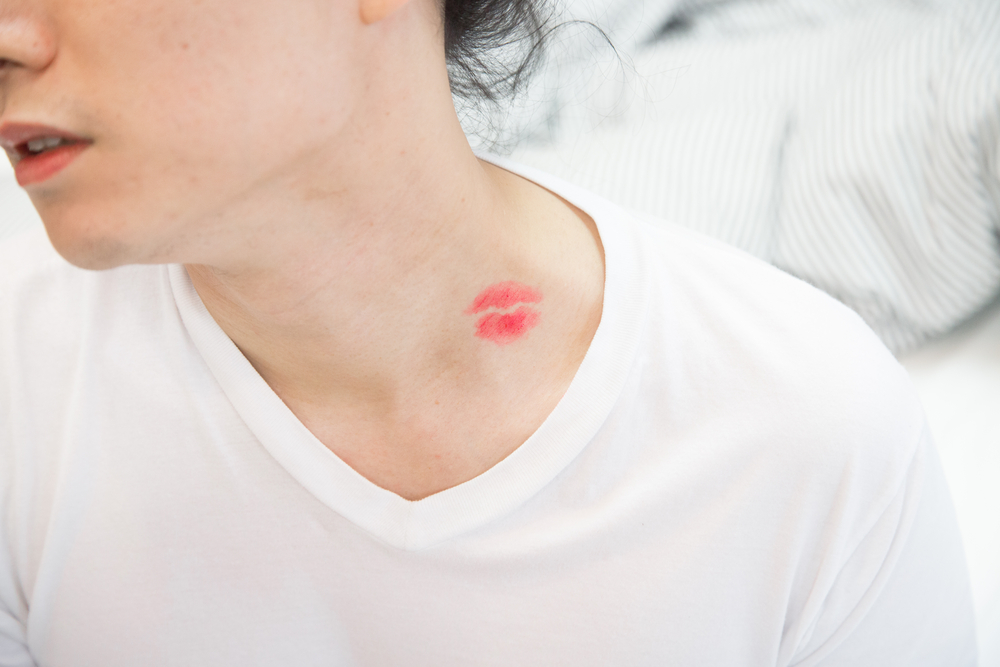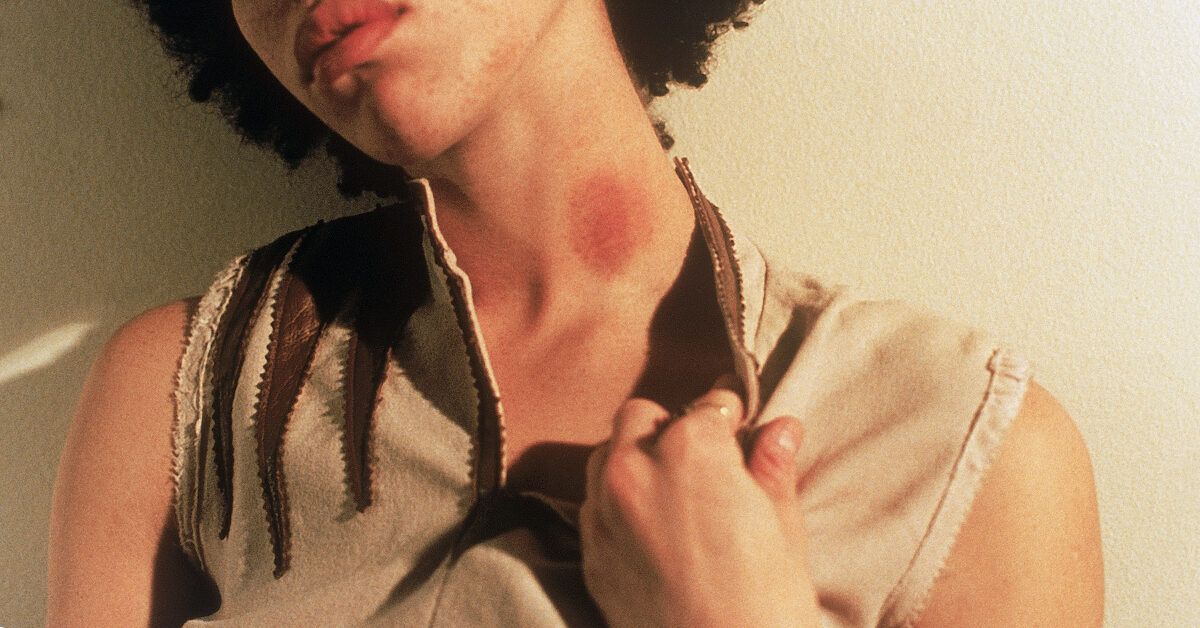Hickeys & Cancer: The Truth! Risks, Myths, And Facts
Can a passionate moment leave you with more than just a memory? The pervasive myth that hickeys can cause cancer is unequivocally false. But what is the truth about these love bites, and should you be concerned about anything beyond their temporary appearance?
Let's address the elephant in the room: hickeys, also known as love bites, are essentially bruises. They occur when someone sucks or lightly bites the skin, causing small blood vessels beneath the surface to rupture. This results in blood leaking into the surrounding tissue, leading to the characteristic discoloration. While some individuals find hickeys desirable as symbols of intimacy, others may find them embarrassing or even alarming. The burning question on many minds, fueled by online rumors and whispered anxieties, is whether these marks carry any genuine health risks, particularly the dreaded specter of cancer.
| Topic | Information |
|---|---|
| Hickey Definition | A bruise caused by suction or biting that ruptures blood vessels under the skin. |
| Cancer Risk | No scientific evidence links hickeys to cancer. |
| Health Considerations | Generally harmless, but individuals on blood thinners may experience larger and longer-lasting bruises. |
| Healing Time | Typically fades within 1-2 weeks. |
| Remedies | No quick fix exists; remedies aim to reduce inflammation and discoloration. |
| Prevention | Communicate boundaries and preferences with your partner. |
| Misconceptions | Rumors persist about hickeys causing cancer or AIDS, but these are unfounded. |
| Medical Attention | Seek medical advice if signs of infection or other complications arise. |
The anxiety surrounding hickeys and cancer seems to stem from a misunderstanding of both how bruises form and the complex nature of cancer development. Cancer is a disease characterized by the uncontrolled growth and spread of abnormal cells. It arises from a complex interplay of genetic, environmental, and lifestyle factors. The idea that the suction or minor trauma associated with a hickey could trigger this process is simply not supported by any medical or scientific data. The "spider cancer" mentioned in some anecdotes is not a recognized medical term and likely reflects a misunderstanding of a different condition.
- Diva Flawless Search Check Spelling More Tips Here
- Layoffs Tracker Google Amazon Autodesk More Job Cuts
The reality is that hickeys are superficial injuries. While they may cause temporary tenderness or discomfort, they don't penetrate deep enough into the body to affect cellular processes in a way that could lead to cancerous changes. The discoloration you see is simply the result of blood pooling under the skin, and the body will naturally reabsorb this blood over time. The duration of a hickey can vary from person to person, influenced by factors such as skin elasticity, blood circulation, and overall health. In most cases, a hickey will fade within one to two weeks.
Now, while the link between hickeys and cancer is a myth, it's important to acknowledge that any type of skin damage carries a potential, albeit very small, risk of infection. If the skin is broken during the act of creating a hickey, bacteria can enter the wound and cause inflammation or even a more serious infection. Signs of infection include increased pain, swelling, redness, pus, and fever. If you experience any of these symptoms, it's crucial to seek medical attention promptly. Proper hygiene and wound care can significantly minimize the risk of infection.
Furthermore, individuals who are taking blood thinners, such as aspirin or warfarin, may find that hickeys result in larger and more prominent bruises. This is because blood thinners interfere with the body's ability to clot blood, making it easier for blood to leak from damaged vessels. In these cases, it may take longer for a hickey to fade, and the discoloration may be more intense. While this is not a cause for alarm, it's something to be aware of if you are on blood-thinning medication.
So, what can you do to speed up the healing process of a hickey? Unfortunately, there's no magic bullet that will make it disappear overnight. However, there are several strategies you can try to reduce inflammation and promote blood reabsorption. Applying a cold compress to the area within the first 24 to 48 hours can help to constrict blood vessels and reduce swelling. After that, switching to a warm compress can help to improve blood circulation and encourage the body to clear away the pooled blood. Gentle massage around the hickey can also help to stimulate blood flow and promote healing.
Some people suggest using topical creams containing vitamin K or arnica to help fade bruises. Vitamin K is involved in blood clotting, and arnica is an herb known for its anti-inflammatory properties. While there's limited scientific evidence to support the effectiveness of these remedies for hickeys specifically, they are generally considered safe for topical use and may provide some benefit. Other anecdotal remedies include applying pineapple (which contains bromelain, an enzyme with anti-inflammatory properties) or banana peel to the affected area. While these remedies are unlikely to cause harm, their effectiveness is questionable.
Of course, the most reliable way to "get rid" of a hickey is to simply cover it up. Depending on the location of the hickey, you can use clothing, scarves, jewelry, or makeup to conceal it. A concealer that matches your skin tone can be used to camouflage the discoloration, and a foundation can be applied over the top for a more even finish. There are also specialized bruise-covering creams available that offer higher levels of coverage. The key is to choose a product that is appropriate for your skin type and that provides adequate coverage without looking cakey or unnatural.
Beyond the cosmetic concerns and unfounded fears of cancer, the topic of hickeys also raises important questions about consent and communication in relationships. While some people enjoy giving and receiving hickeys as a form of playful intimacy, it's crucial to ensure that both partners are comfortable with the practice. A hickey is, after all, a visible mark that can potentially affect a person's professional or social life. Therefore, it's essential to have an open and honest conversation about boundaries and preferences before engaging in any activity that could result in a hickey.
Furthermore, it's important to respect a partner's wishes if they express discomfort or reluctance about receiving hickeys. Pressuring someone to do something they don't want to do is never acceptable, and it can be a sign of a lack of respect for their autonomy and boundaries. Healthy relationships are built on mutual respect, trust, and open communication, and that includes respecting each other's preferences regarding physical intimacy.
In some cultures, hickeys may be viewed as taboo or inappropriate, and receiving one could potentially lead to negative social consequences. Therefore, it's important to be mindful of cultural norms and expectations when engaging in intimate activities. If you are unsure about your partner's cultural background or beliefs, it's always best to err on the side of caution and ask them directly about their comfort level with hickeys.
In rare cases, aggressive or prolonged suction during the creation of a hickey could potentially lead to more serious complications. One such complication is known as "arterial dissection," which involves a tear in the wall of an artery. While extremely rare, this condition can be life-threatening if it affects the arteries in the neck, as it can potentially lead to a stroke. However, it's important to emphasize that this is an exceedingly rare occurrence, and the vast majority of hickeys are completely harmless.
Another potential, though uncommon, complication is the transmission of herpes simplex virus (HSV). If one partner has oral herpes (cold sores) and performs oral sex on another partner, the virus can be transmitted to the skin, resulting in a hickey-like lesion. This is known as "herpes gladiatorum" and can occur in any area of the body where the virus comes into contact with broken skin. While this is not directly related to the suction of a hickey, it's a reminder of the importance of practicing safe sex and being aware of your partner's health status.
Ultimately, the decision of whether or not to give or receive hickeys is a personal one. There is no right or wrong answer, and what is acceptable to one couple may not be acceptable to another. The key is to communicate openly and honestly with your partner, respect their boundaries, and prioritize their comfort and well-being. If you have any concerns about the health risks associated with hickeys, it's always best to consult with a healthcare professional.
In conclusion, the notion that hickeys can cause cancer is a baseless myth. Hickeys are generally harmless bruises that fade on their own within a week or two. While there are some potential, though rare, complications associated with hickeys, such as infection or arterial dissection, these are not cause for alarm in most cases. The most important thing is to communicate openly with your partner, respect their boundaries, and practice safe sex. Remember, healthy relationships are built on trust, respect, and mutual understanding, and that includes being mindful of each other's preferences regarding physical intimacy. So, enjoy your passionate moments, but do so responsibly and with consideration for your partner's well-being.
The discoloration associated with a hickey is simply the result of blood pooling under the skin, and the body will naturally reabsorb this blood over time.
While hickeys are not dangerous and do not cause cancer, there are other health considerations to keep in mind.
For individuals taking blood thinners, such as aspirin or other anticoagulants, hickeys can lead to larger bruises that last longer due to the bloods reduced ability to clot.
Anything in ridiculous doses can increase cancer risk (there's junk work on lab rats that capitalizes on this).
Love reasonably & be happy.
In conclusion, the idea that love bites, also known as hickeys, can cause cancer is largely a myth.
While love bites can result in skin damage and potential complications, such as skin infections, there is no direct evidence linking them to the development of cancer.
A hickey is not permanent, nor is the possibility of hickeys dangerous entirely true either.
A hickey is not dangerous because it does not put your life in danger.
While there is no cure for hickeys, you can get rid of hickey presence by hiding it with a cloth piece.
You can apply the peel directly to your hickey, and it may help reduce signs of bruising and irritation.
Leave the peel in place for up to 30 minutes, or until the banana peel turns brown.
Ang tsikinini, na tinatawag ding love bite sa ingles, ay isang uri ng pasa.
Sa tuwing sobrang hinihigop ng tao ang balat, ang ugat na daluyan ng dugo malapit sa balat ay maaaring pumutok.
Article Recommendations
- No Results Found Tips For Better Search Queries More
- Search Tips We Did Not Find Results Check Spelling Try Again



Detail Author:
- Name : Dr. Aileen Parker Jr.
- Username : meda.windler
- Email : reynolds.michel@weissnat.org
- Birthdate : 1997-10-21
- Address : 2869 Bins Turnpike Apt. 661 Reillyville, NJ 48347-9985
- Phone : +1 (332) 405-1871
- Company : Champlin-Kutch
- Job : Appliance Repairer
- Bio : Nesciunt qui in nobis. Aut doloremque provident et. Omnis qui quod laudantium quia excepturi. Dolorem fugiat similique pariatur enim.
Socials
twitter:
- url : https://twitter.com/grant_christiansen
- username : grant_christiansen
- bio : Quas iusto nesciunt ut rem excepturi autem. Et nobis dolor iste quia mollitia velit ea.
- followers : 6368
- following : 312
facebook:
- url : https://facebook.com/christiansen2005
- username : christiansen2005
- bio : Error dolores perferendis a in.
- followers : 3312
- following : 445
instagram:
- url : https://instagram.com/grant3731
- username : grant3731
- bio : Qui quidem aut voluptas modi quidem. Eveniet facere et aut quo nobis. Est ut voluptas est sit.
- followers : 5432
- following : 1581